Politics
Bipartisan Senators Urge Passage Of Marijuana Banking Through Defense Bill

Bipartisan members of a key Senate committee sent a letter on Tuesday urging the chamber to adopt language from a House-passed national defense bill that would protect banks that service state-legal marijuana businesses.
The House approved its version of the must-pass National Defense Authorization Act (NDAA) in September, with an amendment that would prevent financial institutions from being penalized by federal regulators solely for working with cannabis companies operating in compliance with state law.
Now a group of five members on the Senate Armed Services Committee have asked leadership to ensure that the final package that comes out of bicameral conference committee retains that language before the measure is sent to President Joe Biden for his signature.
Led by Sen. Jacky Rosen (D-NV), the letter states that “financial institutions are often reluctant to transact with cannabis-related businesses, even in states that have some form of legalized cannabis, due to legal and regulatory risks arising from inconsistent federal and state laws.”
“Allowing cannabis businesses operating legally and in compliance with state law to access financial services without federal reprisal would address public safety and compliance challenges, helping communities reduce cash-motivated crimes,” it continues.
Passing the Secure and Fair Enforcement (SAFE) Banking Act through NDAA “would support a rapidly growing industry that creates jobs, supports small businesses, and raises revenue in states that have chosen to legalize cannabis, while reducing safety risks,” the letter—which was also signed by Sens. Gary Peters (D-MI), Angus King (I-ME), Kevin Cramer (R-ND) and Mark Kelly (D-AZ)—says.
The House has passed the SAFE Banking Act five times now, most recently as an amendment to the NDAA that earned overwhelming bipartisan support. Let's get this done. https://t.co/v7iFfMWQjx
— Senator Jacky Rosen (@SenJackyRosen) November 23, 2021
The SAFE Banking Act has been approved in some form in the House five times now, but it’s so far languished in the Senate. Stakeholders have held out hope that the chamber would advance the legislation with a Democratic majority, but some key players like Senate Majority Leader Chuck Schumer (D-NY) have insisted on passing comprehensive legalization—like a reform bill he’s finalizing—first.
That said, Schumer has signaled that he’s open to enacting banking reform through NDAA if it contained social equity provisions.
“The bill’s list of co-sponsors is also bipartisan in both the House and the Senate. Given the demonstrated broad support for this measure, we ask you to ensure that the text of the SAFE Banking Act remain in the forthcoming final conference version of the FY22 NDAA by the Senate receding to the House of Representatives on Title LIV of H.R.4350 (Sections 5401 through 5415),” the new letter concludes. “This will help cannabis-related businesses, create jobs, and strengthen public safety in our communities.”
The Senate has not yet passed its version of NDAA yet, but after it does, a bicameral panel of negotiators will be appointed to reconcile the differences between the measure and the one the House has already approved. It will be up to that conference committee to decide whether the cannabis banking language makes it to the president’s desk.
Earlier this month, a bipartisan coalition of two dozen governors implored congressional leaders to finally enact marijuana banking reform through the large-scale defense legislation.
A group of small marijuana business owners also recently made the case that the incremental banking policy change could actually help support social equity efforts.
Rodney Hood, a board member of the National Credit Union Administration, wrote in a Marijuana Moment op-ed last month that legalization is an inevitability—and it makes the most sense for government agencies to get ahead of the policy change to resolve banking complications now.
Meanwhile, an official with the Internal Revenue Service said last month that the agency would like to “get paid,” and it’d help if the marijuana industry had access to banks like companies in other legal markets so they could more easily comply with tax laws.
Federal data shows that many financial institutions remain hesitant to take on cannabis companies as clients, however, which is likely due to the fact that the plant is a strictly controlled substance under federal law.
Read the congressional letter on passing marijuana banking reform through the NDAA below:
Click to access 20211123-fy22-ndaa-safe-banking-letter.pdf















